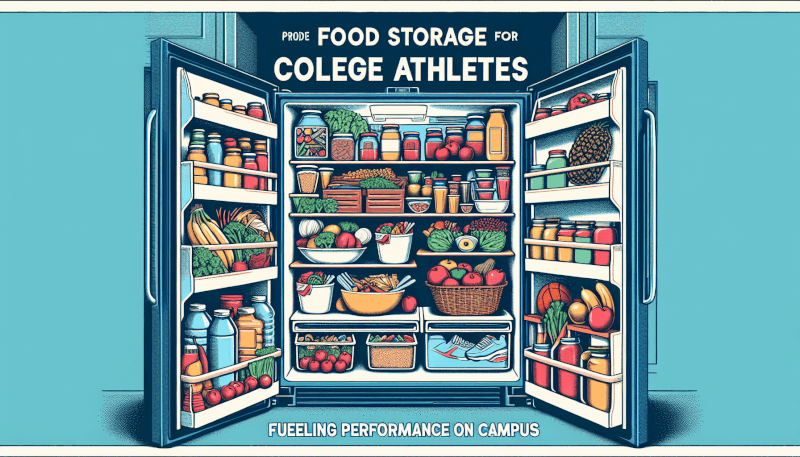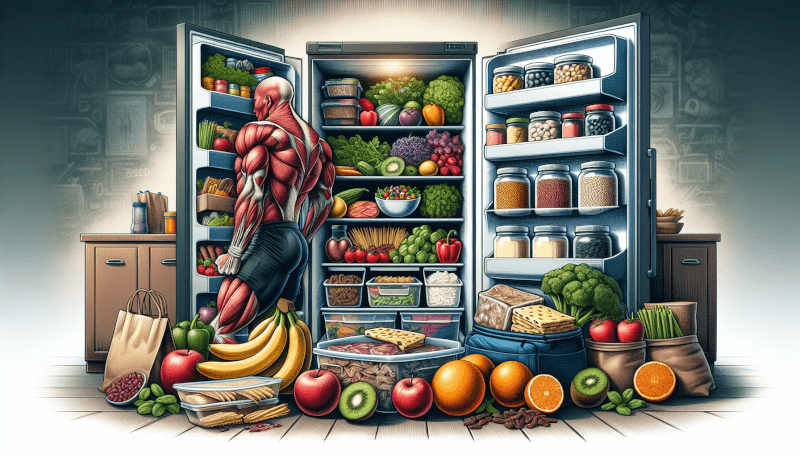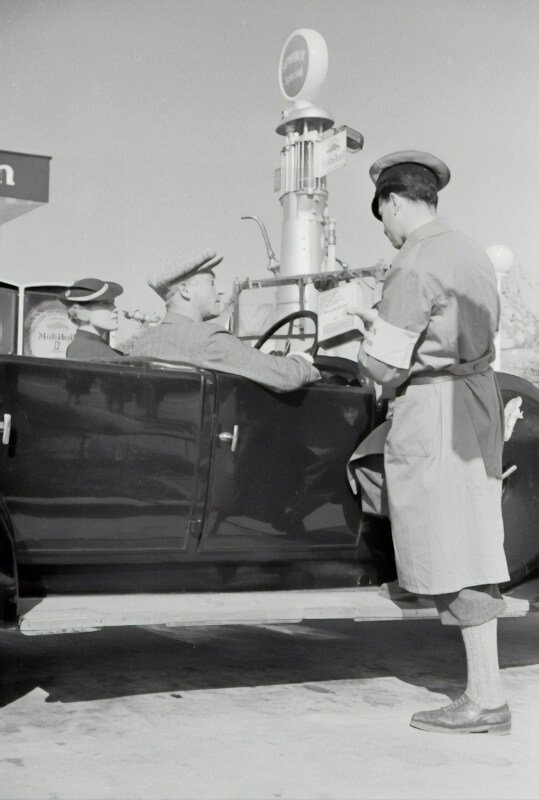Being a college athlete is no easy feat. Between grueling practices, intense workouts, and demanding game schedules, it can often be a challenge to find the time and energy to properly fuel your body. That’s where food storage comes in. With the right strategies for storing and organizing your meals and snacks, you can ensure that you have the necessary fuel to perform at your best on campus. In this article, we will explore the importance of food storage for college athletes and provide tips on how to efficiently store and prepare your meals for optimal performance.

Importance of Proper Nutrition for College Athletes
As a college athlete, you are well aware of the importance of physical fitness and training for performance. But one aspect that often gets overlooked is nutrition. Proper nutrition plays a crucial role in athletic performance and overall well-being. It provides the fuel your body needs to perform at its best, helps with muscle recovery, and supports your immune system.
The role of nutrition in athletic performance
Nutrition plays a vital role in athletic performance. It provides the necessary energy for training and competition, aids in muscle recovery, and helps maintain optimal body composition. Without proper nutrition, your performance may suffer, and you may be more prone to injuries and illnesses. By fueling your body with the right nutrients, you can enhance your athletic performance and reach your full potential.
Specific nutrient needs for college athletes
As a college athlete, your body has higher nutrient needs compared to the average person. You need to consume adequate amounts of carbohydrates, proteins, and fats to meet your energy requirements and support muscle growth and repair. Additionally, important micronutrients such as vitamins and minerals play a crucial role in various physiological processes and should be included in your diet. It’s important to work with a registered dietitian or sports nutritionist to determine your specific nutrient needs based on your sport, training intensity, and goals.
Benefits of maintaining a well-balanced diet
Maintaining a well-balanced diet has numerous benefits for college athletes. First and foremost, it provides the energy you need to perform at your best during workouts and competitions. It helps with muscle recovery and repair, allowing you to bounce back stronger after intense training sessions. A well-balanced diet also supports your immune system, reducing the risk of getting sick and missing out on important training opportunities. Furthermore, proper nutrition can help with mental clarity, focus, and overall well-being, allowing you to excel both on and off the field.
Understanding Caloric Requirements
To fuel your athletic performance, it’s crucial to understand your individual caloric requirements. The number of calories you need depends on various factors such as your body weight, height, age, gender, activity level, and sport. Calculating your caloric needs can help ensure you’re consuming enough energy to meet the demands of your training and competition schedule.
Determining individual caloric needs
To determine your individual caloric needs, you can use various methods such as the Harris-Benedict Equation or consult with a registered dietitian or sports nutritionist. These professionals can help assess your body composition, activity level, and goals to provide you with personalized caloric recommendations. It’s important to reassess your caloric needs regularly as they may change based on your training load and goals.
Factors influencing caloric requirements
Several factors influence your caloric requirements as a college athlete. Your training intensity and duration play a significant role in determining how many calories you need to consume. Endurance athletes, such as long-distance runners, may require more calories compared to strength athletes, like weightlifters. Your body composition and goals also impact your caloric needs. If you’re trying to gain muscle mass, your calorie intake will be higher compared to someone trying to maintain their weight. Lastly, factors such as your metabolism, genetics, and overall health can also influence your caloric requirements.
Balancing energy intake and expenditure
Maintaining a balance between energy intake and expenditure is essential for college athletes. Consuming enough calories to provide energy for training, recovery, and daily activities is crucial. However, it’s important not to overeat and consume excess calories that could lead to weight gain or negatively impact your performance. On the flip side, not consuming enough calories can lead to energy deficiencies and hinder your athletic performance. Striking a balance between energy intake and expenditure is key to fueling your body and optimizing your performance.
Building a Well-Stocked Pantry
One way to ensure you’re meeting your nutritional needs as a college athlete is by building a well-stocked pantry. Having nutrient-dense foods readily available will make it easier for you to prepare nutritious meals and snacks, even when you’re pressed for time.
Choosing nutrient-dense foods
Nutrient-dense foods are packed with essential vitamins, minerals, and macronutrients but relatively low in calories. These foods provide you with the most nutritional bang for your buck. Include foods such as fruits, vegetables, whole grains, lean proteins, dairy products, and healthy fats in your pantry. Opting for minimally processed foods and avoiding sugary snacks and beverages can help ensure your pantry is stocked with nutrient-dense options.
Essential food groups for athletes
As an athlete, it’s important to include foods from all essential food groups to ensure you’re getting a wide range of nutrients. Carbohydrates are a key fuel source for athletes and should make up a significant portion of your diet. Opt for whole grains, fruits, and vegetables as your primary carbohydrate sources. Proteins are crucial for muscle repair and growth, so include lean meats, poultry, fish, beans, and tofu in your pantry. Healthy fats, such as avocados, nuts, seeds, and olive oil, provide essential fatty acids and help with absorption of fat-soluble vitamins. Finally, don’t forget to include dairy or plant-based alternatives for calcium and other important micronutrients.
Stocking up on healthy snacks
Having healthy snacks readily available is essential for college athletes. Stock your pantry with grab-and-go options such as nuts, seeds, dried fruits, whole grain crackers, and protein bars. Preparing homemade snacks like energy balls or trail mix can also provide you with nutritious options that can be easily packed and taken on-the-go. Be mindful of your snack choices and opt for nutrient-dense options rather than sugary or processed snacks that can leave you feeling sluggish.
Meal Planning and Preparation
In the busy life of a college athlete, meal planning and preparation can be a game-changer. By taking the time to plan your meals and prepare them in advance, you can ensure you have nutritious options available even on your busiest days.
The importance of meal planning
Meal planning is essential for college athletes because it allows you to take control of your nutrition and make intentional food choices. By planning your meals ahead of time, you can ensure you’re meeting your individual nutrient needs, avoid impulse eating, and save time and money. Meal planning also helps you stay organized and reduces stress around mealtime, allowing you to focus on your training and academics.
Creating a weekly meal schedule
Creating a weekly meal schedule can help you stay on track with your nutrition goals. Start by determining the number of meals and snacks you need to consume each day to meet your calorie and nutrient needs. Then, plan out your meals for the week, taking into consideration your training schedule, classes, and other commitments. Make a shopping list based on your meal plan and ensure you have all the necessary ingredients on hand. Having a clear meal schedule for the week will help you stay consistent with your nutrition and make healthier choices.
Batch cooking and food prepping
Batch cooking and food prepping can save you time and simplify your meal preparation process. Set aside a specific time each week to cook large portions of staple foods such as rice, quinoa, roasted vegetables, and grilled chicken or tofu. Divide these cooked foods into individual meal-sized portions and store them in airtight containers in your refrigerator or freezer. Having pre-cooked ingredients readily available makes it easier to throw together a nutritious meal or snack in a matter of minutes, especially when you’re short on time.

Optimizing Nutrient Timing
In addition to what you eat, when you eat can also have a significant impact on your athletic performance. Optimizing nutrient timing allows you to strategically fuel your body before and after workouts and competitions to enhance performance and aid in recovery.
Pre-workout nutrition strategies
What you eat before a workout or competition can impact your energy levels, focus, and endurance. Aim to consume a balanced meal or snack that provides a combination of carbohydrates, proteins, and fats about 2-3 hours before exercise. This will give your body enough time to digest and absorb the nutrients. Include easily digestible carbohydrates such as fruits, whole grains, or a sports drink to provide immediate energy. Avoid foods high in fat or fiber as they can cause digestive discomfort. Experiment with different pre-workout meals and snacks to find what works best for you and provides sustained energy throughout your training or competition.
Post-workout recovery meals
After a strenuous workout or competition, your body needs nutrients to recover and repair muscles. Consuming a post-workout meal or snack within 30 minutes to an hour after exercise is crucial. This is when your muscles are most receptive to absorbing nutrients. Include a combination of carbohydrates and proteins in your recovery meal to replenish glycogen stores and support muscle repair. Opt for options such as a protein shake, a turkey sandwich on whole grain bread, or Greek yogurt with fruits. Don’t forget to hydrate adequately and include foods that are rich in antioxidants, such as colorful fruits and vegetables, to help reduce inflammation and aid in recovery.
Snacks for sustained energy
As a college athlete, you may have long practice sessions or back-to-back classes which can leave you feeling hungry and fatigued. Having snacks on hand can help provide sustained energy and prevent a drop in performance. Choose snacks that are balanced in macronutrients and provide a combination of carbohydrates, proteins, and healthy fats. Nut butter with whole grain crackers, Greek yogurt with nuts and fruits, or a protein bar are excellent options. Aim to have a snack about 1-2 hours before your training or class to sustain your energy levels throughout.
Hydration for Athletic Performance
Staying properly hydrated is key to maintaining optimal athletic performance. Water plays a crucial role in regulating body temperature, transporting nutrients, and removing waste products. Dehydration can negatively impact your performance, cognitive function, and overall well-being. It’s important to prioritize hydration throughout the day, especially during intense training periods.
The role of water in athletic performance
Water is the most important nutrient for the body, and its role in athletic performance cannot be overstated. It helps regulate body temperature and prevents overheating during intense physical activity. Water is essential for maintaining blood volume and transporting nutrients and oxygen to muscles. It also aids in the removal of waste products produced during exercise. Proper hydration is crucial for ensuring your body can perform at its best and avoid dehydration-related complications.
Signs of dehydration and its impact
Dehydration can have a significant impact on athletic performance. Even mild dehydration can cause fatigue, decreased endurance, impaired cognitive function, and increased perception of effort. Lack of proper hydration can also lead to muscle cramps, dizziness, nausea, and heat-related illnesses such as heat exhaustion or heatstroke. It’s important to recognize the signs of dehydration, such as increased thirst, dark-colored urine, dry mouth, and fatigue, and take immediate action to rehydrate.
Hydration strategies for college athletes
To stay properly hydrated as a college athlete, it’s crucial to have a hydration strategy in place. Start by drinking water throughout the day, even when you’re not training. Aim to consume at least half of your body weight in ounces of water each day, adjusting for your activity level and climate. During workouts or competitions, drink fluids frequently to replace fluids lost through sweat. Sports drinks are beneficial for longer and intense activities as they provide carbohydrates and electrolytes. Always have a water bottle with you and make a habit of sipping water regularly. Remember to hydrate before, during, and after exercise to maintain optimal hydration levels.

Maximizing Nutrient Absorption
Consuming the right nutrients is only half the battle; your body needs to be able to absorb and utilize those nutrients effectively. Maximizing nutrient absorption ensures that you’re getting the most out of your diet and supporting your athletic performance.
Importance of gut health for athletes
Maintaining a healthy gut is crucial for athletes as it impacts nutrient absorption, immune function, and overall well-being. The gut is responsible for breaking down and absorbing nutrients from the foods you eat. Poor gut health can lead to issues such as malabsorption, digestive discomfort, and weakened immunity. To support your gut health, include fiber-rich foods, fermented foods like yogurt and sauerkraut, and prebiotic and probiotic-rich foods in your diet.
Including probiotics in the diet
Probiotics are beneficial bacteria that can help support a healthy gut microbiome. Including probiotic-rich foods in your diet can help improve nutrient absorption, boost your immune system, and reduce gastrointestinal issues. Foods such as yogurt, kefir, kombucha, and sauerkraut are excellent sources of probiotics. Consider incorporating these foods into your daily diet or taking a probiotic supplement to optimize your gut health.
Foods that aid in nutrient absorption
Some foods can enhance nutrient absorption and help you get the most out of your diet. Including foods rich in vitamins and minerals, such as dark leafy greens, citrus fruits, and lean meats, can support better absorption of nutrients. Pairing iron-rich foods with sources of vitamin C, such as spinach with oranges, can enhance iron absorption. Including healthy fats, such as avocado or olive oil, in your meals can aid in the absorption of fat-soluble vitamins like vitamin A, D, E, and K. Experiment with various food combinations and cooking techniques to maximize nutrient absorption and optimize your athletic performance.
Storage Tips and Food Safety
Proper storage of your food is essential for maintaining its freshness and safety. As a college athlete, you may have limited access to groceries or limited time to cook, so it’s important to prioritize food storage and follow food safety guidelines.
Proper storage of perishable foods
Perishable foods, such as meat, dairy products, and cooked leftovers, require proper storage to maintain their freshness and safety. Make sure your refrigerator is set to the appropriate temperature (below 40°F or 4°C), and keep perishable foods stored in sealed containers to prevent cross-contamination and odors. Use the “first in, first out” rule to rotate your perishable foods and ensure you consume them before they spoil. When in doubt, check for signs of spoilage, such as an off smell, excessive mold, or sliminess, and discard any questionable items.
Utilizing airtight containers and storage bags
Investing in airtight containers and storage bags can help extend the shelf life of your food and prevent spoilage. Store dry goods such as grains, nuts, and dried fruits in sealed containers to keep them fresh and protect them from pests. Airtight containers are also useful for storing pre-cooked meals or meal prep ingredients. Storage bags with a zip-lock feature can be handy for storing smaller portions of snacks or liquids. Properly labeling your containers and bags can help you stay organized and prevent any confusion about the contents or expiration dates.
Food safety guidelines for college athletes
Following food safety guidelines is crucial for college athletes to prevent foodborne illnesses. Wash your hands thoroughly with soap and water before handling food or eating. Keep your food preparation areas clean and sanitized to minimize the risk of cross-contamination. Cook foods to their recommended internal temperatures to ensure they are safe to consume. Be mindful of expiration dates and regularly check your pantry and refrigerator for expired or spoiled items. If you’re unsure about the safety of a particular food, it’s better to discard it to avoid the risk of food poisoning.

On-Campus Resources and Dining Options
As a college athlete, you may have access to on-campus resources and dining options that can support your nutrition goals. Familiarize yourself with these resources to make informed choices and maximize the benefits they offer.
Meal plans and dining hall options
Many colleges provide meal plans for students, which can be a convenient way to ensure access to nutritious meals. Take the time to review the meal plan options available to you and choose one that suits your dietary needs and preferences. Look for dining halls or cafeterias that offer a variety of options, including fresh fruits and vegetables, lean proteins, whole grains, and plant-based alternatives. Don’t hesitate to ask for nutrition information or allergen labels if available to make informed choices that align with your goals.
Navigating the cafeteria for optimal nutrition
Navigating the cafeteria can be overwhelming, with numerous food options and temptations available. To make the most of your cafeteria experience, start by surveying the available options before loading your plate. Look for balanced meal options that include a source of protein, whole grains, and plenty of vegetables. Opt for baked or grilled options instead of fried foods, and choose fresh fruits for dessert. Be mindful of portion sizes and listen to your hunger and fullness cues. Consider seeking guidance from a dietitian or nutritionist on campus who can provide personalized recommendations based on your dietary needs and goals.
Campus grocery stores and farmer’s markets
Many college campuses have grocery stores or farmer’s markets nearby, offering fresh produce, proteins, and other nutritious options. Take advantage of these resources to stock up on healthy foods for your dorm or apartment. Compare prices, read labels, and prioritize fresh, whole foods over processed or sugary snacks. Consider partnering with teammates or friends to do group grocery shopping trips to save money and ensure variety in your diet. Exploring local farmer’s markets can be a fun way to support local farmers and discover seasonal produce that can add freshness and flavor to your meals.
Budget-Friendly Strategies for College Athletes
As a college athlete, you may have limited funds to allocate towards your nutrition. However, with some strategic planning and budget-friendly strategies, you can still maintain a healthy and nutritious diet that supports your athletic performance.
Making the most of limited funds
When dealing with limited funds, it’s crucial to prioritize your nutrition and allocate your resources wisely. Start by creating a budget that includes your monthly food expenses. Consider cutting back on unnecessary purchases such as takeout meals or expensive coffee drinks and redirecting those funds towards fresh produce or lean proteins. Look for budget-friendly options at the grocery store, such as store-brand items or purchasing in bulk. Planning your meals and snacks in advance can also prevent impulse purchases and help you stick to your budget.
Affordable and nutritious food options
Eating nutritious food doesn’t have to break the bank. Look for affordable options such as frozen fruits and vegetables, which are just as nutritious as fresh ones but often more budget-friendly. Canned beans, lentils, and chickpeas are also inexpensive sources of protein and fiber. Consider buying whole grains in bulk, such as rice, quinoa, or oats, which tend to be more affordable compared to processed grains. Additionally, legumes, such as lentils or black beans, can be an affordable alternative to meat for protein.
Meal prep on a budget
Meal prepping can be a cost-effective way to ensure you have nutritious meals and snacks throughout the week. Plan your meals around budget-friendly ingredients such as rice, pasta, eggs, and frozen vegetables. Look for sales or discounts on proteins and buy in bulk to save money. Invest in reusable meal prep containers to portion out your meals and reduce reliance on single-use plastic. Consider batch cooking staple foods like grains or proteins and repurposing them into multiple meals throughout the week. By planning ahead and being mindful of your expenses, you can maintain a healthy diet without sacrificing your budget.
In conclusion, as a college athlete, proper nutrition is critical for maintaining your physical performance, supporting muscle recovery, and promoting overall well-being. Understanding your individual caloric requirements, building a well-stocked pantry, meal planning and preparation, optimizing nutrient timing, staying hydrated, maximizing nutrient absorption, following food safety guidelines, utilizing on-campus resources, and implementing budget-friendly strategies are all essential components of fueling your performance on campus. By prioritizing your nutrition and making informed choices, you can optimize your athletic abilities and thrive as a college athlete.



